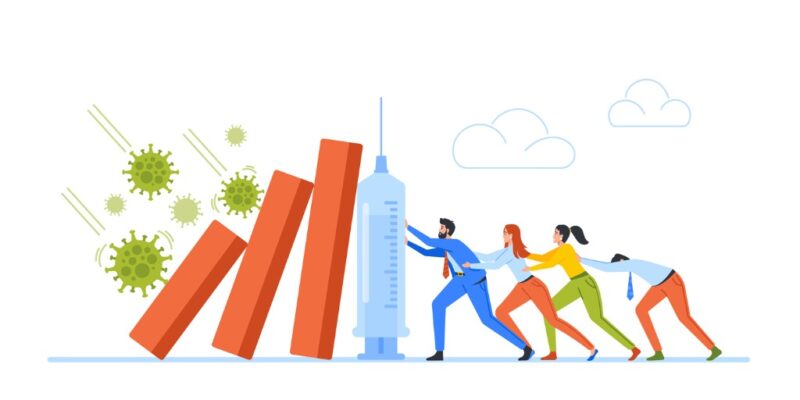
Our new publication, Broader Reach and Stronger Voice: Reflecting on the inclusivity of the COVID-19 vaccine programme and collaboration with the third sector, is now available.
In May 2022 VHS conducted a qualitative study asking our member organisations and wider network about the inclusivity of the COVID-19 vaccine programme and collaboration with the third sector. Having analysed the responses, we can now share our findings.
The clear overwhelming message from the third sector is that we want to be more involved in future public health interventions to reduce inequalities. The COVID-19 vaccine programme has provided us with multiple positive examples of how partnership working can benefit communities and individuals. As one respondent highlighted, partnership working achieves a “broader reach and stronger voice” for all involved.
Third sector and voluntary organisations are trusted by the communities we serve and are therefore well placed to support future public health interventions. The sector is already working with communities who are often underserved and falling through the cracks of services. Our research underlines the value of partnering with representatives from communities and that public health input doesn’t always need to take place on NHS ground.
We need to ensure that partnerships are nurtured and sustained to ensure that those often-underserved groups are supported by trusted community voices to access healthcare. The only way to achieve this is by valuing the third sector as a trusted partner in future interventions to reduce inequalities.
Key Findings:
- The wide range of support provided by organisations can largely be divided into: Supporting the provision of information and enabling people to access the vaccine.
- Partnership working was very effective in supporting the vaccine rollout and 80% of third sector respondents were interested in collaborating with health boards on future public health interventions to reduce health inequalities.
- There were calls from third sector and public sector to actively take the vaccine to under-served communities. This was especially pertinent with organisations supporting people experiencing homelessness or issues with alcohol or drug abuse. For example, bringing vaccinations to hostels and community mental health and addiction services.
- Respondents observed multiple wider benefits for people’s health as a result of the programme, including building trust with services and helping people register people with a GP.
Our Recommendations:
We convened an expert advisory group to help us develop these recommendations to make them as relevant and impactful as possible. We are very grateful to the colleagues from the Community Transport Association, Edinburgh TSI Partnership, Kidney Research UK, the RNIB, the Terrence Higgins Trust and NHS Lothian who contributed to this process.
Partnerships
1. Health Boards should build on the innovative partnership working we saw during the pandemic and work with third sector and community organisations to ensure they reach underserved groups during immunisation programmes.
2. Public health policy should be participatory with creative and meaningful engagement with stakeholders.
Funding
3. Funding for third sector and community organisations to support vaccine information development and dissemination should be built into future immunisation programmes.
Communications
4. Inclusive, accessible and timely communications must be built in from the start of public health interventions as part of communication plans by Public Health Scotland and Scottish Government.
5. We should build on the more creative ways of communicating public health messages we saw during the pandemic.
6. PHS and health boards should develop communications in partnership with trusted organisations from the start.
Accessibility
7. Accessibility of venues and local provision in communities must be key to future screening and immunisation programmes delivered by local Health Boards.
8. Public Health Scotland and health and social care partnerships must consider the health literacy, communication, and marketing implications of vaccinations being moved away from general practice.
Equalities, inclusion and human rights
9. An equalities focus should be built into all future public health interventions, as was seen in the vaccine rollout, to help identify any potential gaps in interventions.
10. Develop a rolling programme of outreach vaccination clinics, services and events.
11. The learning and best practice from NHS and third sector partners should be developed, shared and included in future programmes.
You can read the full report and recommendations here: Broader Reach and Stronger Voice: Reflecting on the inclusivity of the COVID-19 vaccine programme and collaboration with the third sector
VHS has been supported throughout the design and analysis of this research by analysts from the Scottish Government’s Analytical Exchange Programme. We are very grateful for the expertise and the significant time PHS and the Scottish Government dedicated to this piece of work.
For more information please contact our Policy & Engagement Lead, Kimberley.
